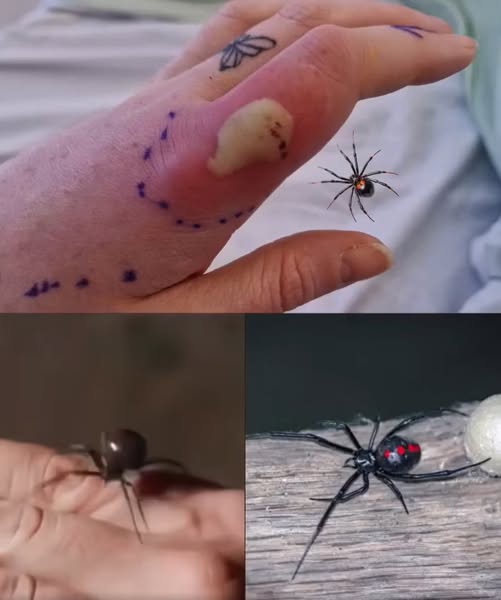If you ever get bitten by a spider, it’s important to stay calm and know how to respond—especially when the spider in question is a Black Widow or a Brown Recluse. These two species are considered the most medically significant spiders in the United States. Though bites are rare, they can lead to serious health complications if not treated properly.

Knowing how to identify these spiders, recognize the symptoms of their bites, and respond quickly can make a big difference in recovery. The Brown Recluse spider is typically light to dark brown in color and is most recognized by the violin-shaped marking on its back, which gives it the nickname “fiddleback spider.” Brown Recluses are reclusive by nature, preferring to hide in dark, undisturbed areas like closets, attics, basements, or behind furniture. They tend to bite only when they feel threatened or accidentally trapped against skin. At first, their bite may go unnoticed—it often starts out painless.
However, over time, the site may become red, swollen, and blistered. In more severe cases, the venom can cause necrosis, a condition where the surrounding tissue begins to die. Symptoms may also include fever, chills, nausea, and general discomfort. While death from a Brown Recluse bite is extremely rare, serious complications can occur if the wound becomes infected or if medical treatment is delayed. On the other hand, the Black Widow spider is easily identified by its glossy black body and the distinctive red hourglass marking on the underside of its abdomen. Female Black Widows are responsible for most bites and tend to be more aggressive when defending their web or egg sacs. The venom of a Black Widow is neurotoxic, which means it affects the nervous system.
A bite can cause intense pain, muscle cramping, nausea, sweating, and even breathing difficulties—symptoms that usually appear within 30 to 60 minutes of being bitten. In especially severe cases, particularly involving children, older adults, or those with compromised immune systems, antivenin may be required to counteract the effects of the venom. If you suspect you’ve been bitten by a Black Widow, start by washing the bite area with soap and water to prevent infection. Apply a cool compress to reduce swelling and help relieve pain. Over-the-counter pain relievers like acetaminophen or ibuprofen can also be helpful.
However, if muscle cramps, intense pain, or difficulty breathing begins, seek medical attention immediately. A healthcare provider may administer antivenin, prescribe muscle relaxants, or give pain medications depending on the severity of symptoms. For Brown Recluse bites, wash the area with soap and water and keep it elevated to reduce swelling. Apply a cold compress, but avoid using ice directly on the skin. Do not apply heat, as it can make the venom spread faster. Monitor the wound closely—if it begins to grow larger, darken in color, or develop open sores, medical attention is necessary. Your doctor might prescribe antibiotics or other treatments to prevent or treat infection. In very rare cases, surgery might be needed to remove dead tissue. If possible, safely capture the spider that bit you—without putting yourself at risk—and bring it with you to the doctor. Proper identification can help healthcare professionals determine the best course of action. However, never delay medical care just to find the spider. Prevention is also key. To avoid bites, keep your home clean and clutter-free, especially in areas like closets, basements, and garages where spiders like to hide. Shake out shoes, towels, and clothing that have been sitting untouched for a while. Wear gloves when reaching into dark or outdoor storage areas, and seal cracks and crevices around windows and doors to prevent spiders from entering your home. While the idea of being bitten by a spider like a Black Widow or Brown Recluse is scary, it’s important to remember that most bites are treatable and rarely life-threatening. With prompt care and a calm response, recovery is usually swift and complete.





